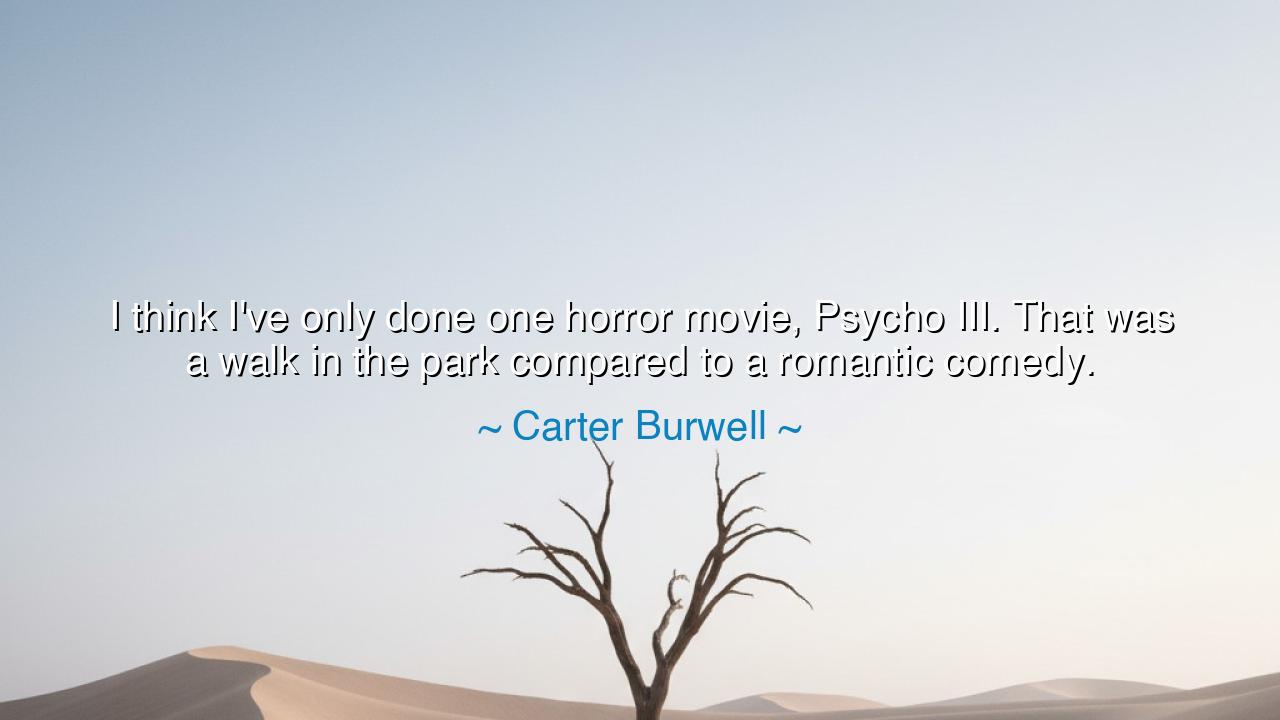
I think I've only done one horror movie, Psycho III. That was a
I think I've only done one horror movie, Psycho III. That was a walk in the park compared to a romantic comedy.






“I think I’ve only done one horror movie, Psycho III. That was a walk in the park compared to a romantic comedy.” Thus spoke Carter Burwell, master of music for the screen, and in his words we hear a paradox that startles the heart. For who would think that tales of terror, drenched in shadows and dread, could be easier to shape than the tender laughter of love? Yet his insight is profound: to evoke fear is a matter of instinct, but to stir joy, intimacy, and truth in the realm of romance is a craft as delicate as weaving spider silk beneath the gaze of heaven.
The ancients themselves understood this. The bards who told of monsters—Cyclopes, Furies, and Gorgons—needed only to awaken primal fear in their listeners, and their work was done. The shudder of the crowd confirmed their success. But those who sang of love, of longing, of reconciliation, bore a heavier burden. They had to move hearts without deceit, to capture the strange balance of joy and sorrow that dwells in every union. Fear speaks to the body, but love must speak to the soul. Thus, Burwell is right to say that the romantic comedy demands far more from the artist than the horror movie.
Consider the story of Shakespeare, who wrote both tragedies of horror and comedies of romance. His Macbeth, steeped in witches and murder, shocks the audience with blood and doom; yet it is his comedies—Much Ado About Nothing, As You Like It—that endure as the most intricate works of wit and tenderness. In those plays, laughter is born from misunderstanding, healing from humility, and love from struggle. To craft such harmony is a feat greater than conjuring fear, for the human heart opens more easily to terror than it does to joy.
Burwell’s experience reveals another truth: the horror movie is bound by conventions—the dark hall, the sudden shock, the ominous music. The path is clear, and the response almost guaranteed. But in a romantic comedy, the path is not so straight. The audience will accept nothing false. They must feel the sincerity of affection, the sting of vulnerability, the awkward charm of laughter born from longing. The score, the dialogue, the very pacing of the story must be woven with care, lest the whole illusion collapse into emptiness.
History offers us an example in the life of Mozart, who composed both the haunting Don Giovanni and the playful The Marriage of Figaro. The former, with its spectral terror and descent into hell, is majestic, but in truth it was the latter—the comedy of love, disguise, and forgiveness—that tested his genius most deeply. To balance humor with sincerity, to portray love with lightness and depth at once, was the true challenge of his art. Burwell’s words carry this same recognition: that joy, not horror, is the higher mountain to climb.
Thus, the teaching emerges: it is easier to shake people with fear than to lift them with laughter and love. Fear requires only instinct; love demands truth. To create joy in others, whether through music, words, or deeds, is a work of great courage, for it asks us to open our own hearts first. To write or live a romantic comedy is to expose one’s vulnerability, to invite trust, to reveal the beauty and folly of the human spirit.
Practical action flows from this wisdom: do not underestimate the power of joy. Strive to bring laughter, tenderness, and connection into your work and your life, even though it is harder than sowing fear or cynicism. Learn to speak the language of the heart, not only the language of survival. And when you labor to uplift others, remember Burwell’s paradox—that it is the most difficult path, yet also the most rewarding.
So, children of tomorrow, remember this: horror will always find its way to the human heart unbidden, but love must be carefully cultivated. Choose, then, the harder work. Be the weaver of joy, the builder of comedies, the singer of love’s music. For though it is no “walk in the park,” it is the labor that shapes eternity.






AAdministratorAdministrator
Welcome, honored guests. Please leave a comment, we will respond soon